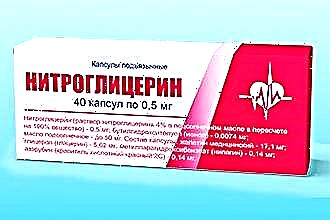Brief instructions for the use of the drug
 K + and Mg2 + are a "metabolic tandem" that supports most of the energy processes in the human body.
K + and Mg2 + are a "metabolic tandem" that supports most of the energy processes in the human body.
Potassium ions are responsible for the transmembrane action potential, maintaining the excitability of neuromuscular fibers, impulse transmission and myocardial contractility.
Mg2 + is a physiological antagonist of Ca2 + ions, the main part of which is contained in the intracellular fluid.
The regulation of the content of these microelements in tissues is provided by the excretory function of the kidneys.
Normally, the same amount of electrolytes is excreted from the human body per day as it comes from food.
Magnesium ions regulate:
- the processes of energy formation and tissue regeneration;
- immune responses;
- the functioning of the conducting system of the heart;
- exchange of cholesterol, proteins, purine bases;
- aggregation capabilities of platelets;
- synthesis of adenosine triphosphate - the main cellular "fuel";
- detoxification functions of the liver, the breakdown of glycogen;
- the function of relaxation of the vascular wall.
Causes of potassium-magnesium deficiency:
- various cardiovascular pathologies;
- dietary changes (unbalanced diet, protein diet, high Ca2 + intake);
- excessive consumption of table salt (sodium chloride);
- uncontrolled use of sorbents, laxatives;
- alcohol abuse;
- type II diabetes mellitus;
- dysfunction of the parathyroid glands;
- malabsorption in the small intestine;
- hereditary kidney disease;
- severe or prolonged diarrhea, vomiting;
- drug therapy (insulin, bronchodilators, Verapamil, loop diuretics, mineralocorticoids, Penicillin, antibiotics of the aminoglycoside group, etc.).
In the Panangin Forte preparation, K + and Mg2 + are in the form of asparaginate salts (a universal conductor of ions into the cellular cytoplasm with a high degree of endogenous affinity, which improves the permeability of the membrane to electrolytes under conditions of oxygen starvation). This form of the active substance quickly compensates for the intracellular deficiency of trace elements.
The drug has antiarrhythmic and antihypoxic effects. By activating Na + -K + -ATPase, which is responsible for the flow of potassium and sodium through the cell membrane, the drug increases the excitation threshold and reduces the rate of conduction of nerve impulses in the myocardium.
Indications for the use of "Panangina Forte":
- as a component of the combined treatment of circulatory failure, angina pectoris, atherosclerosis, in the acute period of myocardial infarction, in patients with ventricular arrhythmias;
- high cardiac risk in patients with comorbid conditions (hypertension, coronary heart disease, endothelial dysfunction, cardiosclerosis, diabetes mellitus);
- long-term use of digitalis drugs ("Digoxin", "Strofantin") to prevent glycosidic intoxication;
- cardiopsychoneurosis;
- enrichment of the diet during a diet or when it is impossible to eat well.
The drug is almost completely absorbed in the gastrointestinal tract and immediately takes part in metabolic processes. The kidneys are mainly responsible for excretion.
Contraindications to the appointment of "Panangina Forte":
- allergy to the constituent substances in the medication;
- acute or chronic renal failure;
- Addison's disease;
- AV block III degree;
- cardiogenic shock (blood pressure below 90 mm Hg).
The drug should not be prescribed to patients taking potassium-preserving diuretics, ACE inhibitors, Cyclosporin, direct anticoagulants, non-steroidal anti-inflammatory substances (hyperkalemia develops during treatment).
Some medications slow down the adsorption of potassium and magnesium from the small intestine (tetracycline antibiotics, iron supplements), so an interval of at least three hours should be maintained between taking such medications.
Panangin Forte should be used with caution in patients:
- with miastenia gravis;
- with extensive skin lesions with burns;
- with acute dehydration;
- with gastrointestinal ulcer.
Even after taking high doses of potassium and magnesium asparaginates, symptoms of poisoning were not observed. Hyperkalemia develops only in patients with impaired renal excretory function.
The development of side reactions is possible:
- diarrhea;
- general asthenia;
- paresthesia;
- decrease in heart rate;
- ventricular arrhythmias;
- vomiting;
- drowsiness;
- lowering blood pressure.
Recommendations for the use of "Panangina Forte"
The routine dosage of the drug is a tablet three times a day. If necessary, the amount can be increased to 2 by 3 rubles / day.
Hydrochloric acid of the stomach reduces the bioavailability of the components of the drug. Therefore, it is recommended to take the medicine during or after meals.
The course of taking "Panangina Forte" is selected for each case individually, taking into account a number of factors.
Differences between "Panangin" and his "Forte" form: what is the difference?
The main difference between Panangina Forte and Panangin is the dosage of potassium and magnesium asparaginate in tablets.
Comparison of the concentration of these elements:
| Active substance | "Panangin" | "Panangin Forte" |
|---|---|---|
| Magnesium aspartate salt | 175 mg | 350 mg |
| Potassium aspartate salt | 166 mg | 332 mg |
Additionally, there are differences in the packaging of the tablets. Ordinary "Panangin", which is produced in Hungary by the pharmaceutical company "Gedeon Richter", is packaged in jars of 50 tab. They are convenient to carry with you in your purse or pocket. Panangin Forte is packed in classic blisters of 15 tabs. The pack contains 30, 60 or 90 tablets.
The cost of Panangin Forte packaging is on average 50% higher compared to the standard dosage.
It should be noted that the cheap substitute for the drug "Asparkam" has a similar active ingredient, but in a lower concentration (175 mg of K + and Mg2 + asparaginate).
When is it better to choose Panangin Forte?
Manufacturers "Panangina Forte" position the drug as one that can be used without a doctor's prescription and even as a supplement to the diet. The need for potassium for an average person per day ranges from 300-350 mg, for magnesium - 350-400.
Often, the lack of K + and Mg2 + are interrelated. Magnesium deficiency aggravates the manifestations of hypokalemia, especially in patients who have to constantly take loop diuretics, provoking refractoriness to treatment with drugs containing only potassium.
Due to the Mg2 + depot, in the bone tissue, according to clinical analyzes, its deficiency may not be detected (normal plasma concentration). But only 75% of the population receive this trace element from food in sufficient quantities.
In 90% of patients who underwent cardiac events, magnesium deficiency is found, which is aggravated in the acute period of myocardial infarction.
With age, the absorbent capacity of the small intestine decreases, and in parallel, the need for K +, Mg2 + increases.
With a deficiency in the body of these electrolytes, the following is observed:
- decreased muscle tone;
- interruptions in cardiac activity (the tendency to arrhythmias increases);
- increased blood pressure;
- depression;
- paresthesia;
- chronic fatigue.
In patients with chronic cardiovascular pathologies, potassium-magnesium deficiency aggravates the course of the disease and increases the likelihood of complications.
Reception of "Panangina Forte" according to the literature is recommended:
- all patients over 45 years of age without renal impairment;
- athletes, people actively involved in fitness;
- workers of heavy physical labor;
- people who often visit the sauna;
- individuals who constantly adhere to diets, have restrictions in their daily diet, use herbal teas in order to lose weight;
- women taking birth control pills;
- patients with arterial hypertension (as prescribed by a doctor);
- those taking glucocorticoids, loop diuretics, sedatives;
- patients with diabetes mellitus, widespread atherosclerosis, hypercholesterolemia;
- people suffering from cramps and pain in the calf muscles;
- patients who are constantly taking enzyme preparations, medicines to improve gastrointestinal motility.
Conclusions
Panangin Forte in the Russian pharmaceutical market has established itself as an affordable, high-quality and easy-to-use drug for maintaining electrolyte balance.
But it should be borne in mind that its use is not able to cure diseases of the heart, nervous or endocrine system, but only to supplement the drug complex for adequate correction of the conditions that have arisen.
Patients with impaired renal and adrenal excretory function, arterial hypertension, before using Panangin Forte, should definitely consult a doctor.



